2016
A Person, Not A Thing

It is so much easier to label someone than to enter in with them as person. Life is simpler if we look at someone and say, “Conservative”, “Liberal”, “Republican”, “Democrat”, and so on. However, when we apply these labels we do two things.
First, we distance ourselves from them as people. We are saying, “You’re this or that and I’m not.” This distance gives us permission to caricature, to mock, to be unloving without seeing the consequences. When there’s distance we are able to ignore the response of the individual. By creating this distance we are able to only see them as a group and not as individuals.
This is the second, even more insidious problem, with categorizing or labeling people; it is this, we remove their person-hood. When someone becomes a “Millenial” or a “Protester” or a “Conservative” or a “Liberal” in our minds they cease to be a person. They stop being “John” or “Sara” or “Corinne” or “Joe.” The moment we replace their person-hood in our minds we lose the need for compassion and empathy.
Not only that, but I would argue we lose the ability for compassion and empathy. We don’t feel compassion and empathy for objects. Compassion and empathy are for us to extend to other people. When we remove someone’s person-hood they become a thing. Things don’t have feelings, emotions, or soul so they don’t need compassion, they don’t need empathy.
I can’t help but have the scene from A Few Good Men running through my mind where Weinberg and Kaffee are prepping Downey for trial. Downey keeps referring to the victim of the crime that he’s charged with as, “Willie.” Weinberg tells him he needs to call him, “Private Santiago.” Kaffee interjects, “Yeah, because if he’s Willie then he has friends and a mother who will miss him.”
Kaffee and Weinberg knew that as the defense attorneys they needed to de-humanize the victim, PFC William T. Santiago, or they would have no chance at winning. Why? Because, if he was a real person then the jury would have compassion and empathy and would likely decide to convict.
What’s the alternative? The alternative is to listen and learn to people as individuals. When we do this we enter in with them as humans, as persons.
It’s so easy to hate a group of people. It’s really hard to hate a person. I was having a conversation with a friend who was very happy about the results of the current election. He asked me my opinion. I told I have grave concerns about the election results. He was shocked and asked why. The reasons are many, but I decided to tell him the story of my neighbor who is immigrating from Mexico. He met and fell in love with the woman of his dreams while she was studying abroad in Mexico and they recently got married and he moved to the United States. He’s now deeply worried that he will be deported. He’s a newlywed with an amazing bride. They are making a home for themselves. Yet, every day he now lives with fear in the back of his mind. My friend’s initial response was, “That’s foolish, he’s here legally, that’s not who the President-elect wants to get rid of.” As we talked more, I realized that he didn’t see my neighbor as a person. He saw him as part of a group of people who were “stupid and silly.”
I had a conversation with another friend who was distraught over the election. She was asking how anyone could possibly vote for a demagogue like the President-elect. In her mind, all “those people” are racist, misogynist, bigots. I told her the story of my friend who is a police officer. Every single day he leaves his family to put his life in danger. He never knows if he will come back. As police ambushes continue to grow in frequency he grew more and more worried and fearful that he would not come home. He has an amazing wife and kids. Yet every day he lives with this fear in the back of his mind. He believed that he would have a better chance of coming home at the end of his shift if the, now, President-elect won the election. Her response, “That’s foolish. He’s the real problem anyway.” As we talked more, I realized that she didn’t see my friend as a person. She saw him as part of a group of people who were “racist and evil.”
Objects don’t have stories. Things are just that, things. Things are easily disposed of when they no longer meet our needs or when we determine they are broken.
People on the other hand have stories. They have friends and mothers who love them. A person is hard to hate when you enter in long enough to get to know their story. What happens is that you discover you have compassion and empathy for them.
In 1 Corinthians 12, the apostle Paul writes,
But God has so composed the body, giving greater honor to the part that lacked it, that there may be no division in the body, but that the members may have the same care for one another. If one member suffers, all suffer together; if one member is honored, all rejoice together. Now you are the body of Christ and individually members of it.
The body of Christ is this amazing blend of unity in diversity. The Christian is part of something bigger than themselves, a group, but also retain their individuality. The beauty of this is that there is no loss of person-hood but it is enhanced. All suffer together and all rejoice together. As one goes, so goes all.
May we set aside the labels and the categories. May we move toward one another as people, real people, people with stories and friends and mothers.

A Person, Not A Thing was originally published in The Subversive Journey on Medium, where people are continuing the conversation by highlighting and responding to this story.
from The Subversive Journey https://danielmrose.com/a-person-not-a-thing-27133afdbd89?source=rss—-bbc765b79ec5—4
via IFTTT
The Curse Is Gone!
The Curse Is Gone

Last night an epic World Series ended with one of the greatest game sevens in the history of sports. The Chicago Cubs defeated the Cleveland Indians in the tenth inning, 8–7. The Cubs had not won the World Series in 108 years. The reason for this drought was the Curse of the Billy Goat. A few years ago the Boston Red Sox ended their World Series drought overcoming the Curse of the Bambino (the Red Sox traded Babe Ruth to the Yankees).
As the sun rose this morning we entered into a world where there were no more curses in baseball.
Sure, there are teams that haven’t been to or won the Series in a long time but none of them point to a curse. It’s just that they’ve been bad. The Cubs and Red Sox added to the lore of the game with their longstanding curses.
The curse is gone.
As this reality dawned on me, this verse from the Bible came to mind:
Christ redeemed us from the curse of the law by becoming a curse for us — for it is written, “Cursed is everyone who is hanged on a tree” — so that in Christ Jesus the blessing of Abraham might come to the Gentiles, so that we might receive the promised Spirit through faith.
Humanity was at one time cursed too. Our curse was deeper than goats and bad baseball trades. Our curse was due to our inability to live up to the law of God. We couldn’t perfectly follow it. It became a curse to us. This curse caused a separation between us and God, between us and one another, and between us and the creation.
We could never overcome the curse on our own. It required the help of another. We needed a redeemer. Jesus was that redeemer for us. To redeem us he had to become a curse on our behalf. He bought the Gentiles back from being separated from God and his people.
By ending the curse, Jesus made a way for us to be part of the people of God. The blessing of Abraham, to be God’s people, and the Spirit, are given to us. This is what happened when God destroyed the curse.
We experience this curse being lifted by faith. Faith in the redeemer. A redeemer who became a curse for us.
The Red Sox and Cubs hired a man named Theo Epstein. He built the organizations and made them champions. He broke their curses. To do so required ownership, coaches, and players to have faith in him and his process. They needed someone from the outside to fix them and overcome their curses.
Humanity is the same. We are cursed. We live in rebellion and fail to keep God’s law. We need someone to come in from the outside who knows how to fix us and overcome our curse. Jesus does. Just like the ownership of the Red Sox and Cubs had to trust Theo Epstein, so too do we need to trust Jesus.
What a glorious thing to live life free of the curse. The curse that brought with it shame and guilt. To be freed from shame and guilt is to be freed to have life and have it to the full!
About the Author
Daniel Rose is a husband, dad, and pastor of The Antioch Movement in Ypsilanti, MI. He writes at The Subversive Journey and you can connect with him on Facebook, Instagram, and Twitter.
If you found this post helpful, inspirational, or just OK make sure you click on the heart and recommend it!
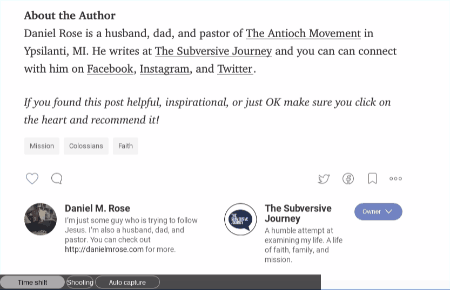

The Curse Is Gone! was originally published in The Subversive Journey on Medium, where people are continuing the conversation by highlighting and responding to this story.
from The Subversive Journey https://danielmrose.com/the-curse-is-gone-d57a16c01186?source=rss—-bbc765b79ec5—4
via IFTTT
From Shame to Honor

In John 4 there’s a story that grabs me. It’s a story of shame being turned to honor. It’s a story that is, in its purest sense, a story of redemption.
In John 4 we read of a Samaritan woman who has to come and draw water in the heat of the day. She couldn’t come in the morning like the other women of her city because she was an outcast. She had five husbands and the one she was currently with, wasn’t her husband. A scandalous woman!
She arrives at the well to see a Jewish man hanging out. This was shocking as many Jews would walk around Samaria altogether. Then this man did the unthinkable, he asked for water. It almost certain that he knew what kind of woman she was, coming alone to the well in the middle of the day. How could a Jewish man ask such a sinful woman to draw him water?
The encounter presses on and Jesus reveals himself to this woman as the Christ. He offers her living water, from which she would never thirst again.
She leaves her water jug and runs to town and proclaims the good news! The townsfolk come to see this Christ. Many believe because of her testimony and many believe because of Jesus’ own words.
She goes from outsider to insider. The shame this woman experienced was gone. She was now a representative for Jesus. She was his ambassador. Who knows how many more lives she influenced.
I am struck by this woman’s candor. She is brutally honest with Jesus and he doesn’t bat an eye. He commends her for humility and honesty. She experiences grace and as Jesus reveals himself, she is free from shame. She steps into a place of honor.
How many of us are hiding or trying to hide from Jesus issues in our lives? While we might not have been married five times and living with someone, we all have things that we don’t want people to know about, particularly God. We hold onto and hide that area of our life because we experience shame. What we don’t realize is that if we can be honest, then in the midst of that shame we will find that Jesus is more than willing to reveal himself.
Shame and guilt grow strong in the dark. The light destroys them.
Grace and freedom grow strong in the light.
Consider these words from 1 John 1 drives this story home:
This is the message we have heard from him and proclaim to you, that God is light, and in him is no darkness at all. If we say we have fellowship with him while we walk in darkness, we lie and do not practice the truth. But if we walk in the light, as he is in the light, we have fellowship with one another, and the blood of Jesus his Son cleanses us from all sin. If we say we have no sin, we deceive ourselves, and the truth is not in us. If we confess our sins, he is faithful and just to forgive us our sins and to cleanse us from all unrighteousness. If we say we have not sinned, we make him a liar, and his word is not in us.
About the Author
Daniel Rose is a husband, dad, and pastor of The Antioch Movement in Ypsilanti, MI. He writes at The Subversive Journey and you can connect with him on Facebook, Instagram, and Twitter.
If you found this post helpful, inspirational, or just OK make sure you click on the heart and recommend it!
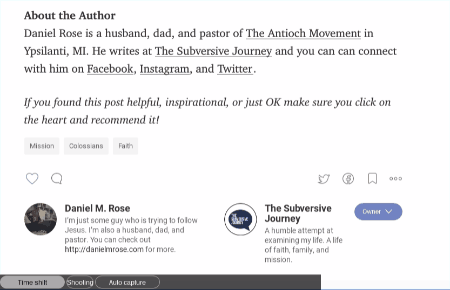

From Shame to Honor was originally published in The Subversive Journey on Medium, where people are continuing the conversation by highlighting and responding to this story.
from The Subversive Journey https://danielmrose.com/from-shame-to-honor-9459748da85?source=rss—-bbc765b79ec5—4
via IFTTT
The Truth is Personal

Shortly after I got serious about trying to follow Jesus I became consumed with “the truth.” I printed off hundreds of pages of articles from the Internet that helped me argue for “the truth.” I wasn’t interested, at that time, with “the truth” so much as I was interested in being right.
Often, as I shared my faith I camped out on a specific verse, John 14:6, which reads —
I am the way and the truth and the life. No one comes to the Father except through me.
It has taken me a long time, a very long time, to grasp the reality that Jesus said he is the truth.
Truth is personal.
When truth is found in a person, it is relational. It is both, subjective and objective.
When truth is a person it means that you can engage with the truth in a much different way than you do with 2+2=4.
I desperately want people to know the truth. This means that I want them to know Jesus. Learning this has freed me. It has freed from having to be right. I am free to not argue someone into the kingdom of God. I am free to invite them to know Jesus.
To be able to introduce people to Jesus is remarkable. He is excellent beyond compare.
Why wouldn’t someone want to learn about Jesus?
Well, because truth is personal.
About the Author
Daniel Rose is a husband, dad, and pastor of The Antioch Movement in Ypsilanti, MI. He writes at The Subversive Journey and you can can connect with him on Facebook, Instagram, and Twitter.
If you found this post helpful, inspirational, or just OK make sure you click on the heart and recommend it!
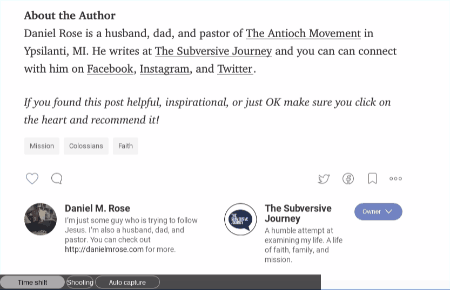

The Truth is Personal was originally published in The Subversive Journey on Medium, where people are continuing the conversation by highlighting and responding to this story.
Read the responses to this story on Medium.
from The Subversive Journey https://danielmrose.com/the-truth-is-personal-ed4af537ac44?source=rss—-bbc765b79ec5—4
via IFTTT
Do Justice. No Really.

Over the last few weeks there is one verse that has been recurring in my thoughts and in my heart and in my soul. It’s been bubbling up like volcanic lava.
Micah 6:8 says,
He [God] has told you, O man, what is good; and what does the Lord require of you but to do justice, and to love kindness, and to walk humbly with your God?
This verse. This one verse is tearing me up. It is chasing me down and it emerges under every rock, every conversation, every reading, and every time I consider this world.
Over the last couple of weeks I have been wrestling with issues of race. It’s so hard. My brother is a police officer and one of my closes friends is too. They are unjustly portrayed by this world. There is real systemic racism that is unjust and innocent people are dying as a result. Too many leaders in the church want to simply brush it under the rug. We don’t want to be unsupportive of police, because they risk their lives to protect us. We want to rally around them and love them well. We also see the injustice that is facing our black brothers and sisters. We are coming to grips with the reality that Dr. Rev. Martin Luther King Jr was right when he said, “An injustice anywhere is an injustice everywhere.”
It’s October and it is Domestic Violence Awareness month. This hits close to home because my cousin is a survivor and advocate. Inside of the homes around us women, children, and men are being abused emotionally and physically. Every day there are headlines of another family murdered by one of the adults in the home.
I sat down recently to read a book that a friend gave me. She said that I absolutely needed to read this book. That we as the people of God need to figure out how to respond to the crisis that is described within its pages. The book was called, The Slave Across the Street. It’s the story of Theresa Flores. She suffered human trafficking as a sex slave at the hands of evil men in Birmingham, MI. Her story is horrific. What is more horrific is that her story is becoming common. According to a congressional finding 100,000–300,000 children are at risk of commercial sexual exploitation in the United States (pg. 151). According to Dr Richard Estes, “Tens of thousands of U.S., Mexican, and Canadian children and youth become victims of juvenile pornography, prostitution, and trafficking every year. (pg. 151)” This problem cuts across ethnic and socio-economic barriers. Nobody is immune.
So what do we do? How do we respond? There is injustice everywhere. There is pain everywhere. There is evil, not some mystic spiritual evil, real evil in our world. What can we do? How do we do justice?
If you’re at all like me you feel almost paralyzed by the fear, anger, and sadness. More and more there is a rage that builds within me as I learn about this broken world. I feel like Neo from the Matrix films. It is as if I have been unplugged from a fantasy land only to enter into “the real.”
“The real” is filled with pain and sorrow and evil and injustice. For the Christian we are called, no, we are commanded to do justice. We do not have the luxury of simply ignoring the injustice in the world. God has commanded us to enter in and do justice.
The thing is, there’s just so much to do. There’s so much injustice in this world it feels like we are storming the gates of Hell with squirt guns.
- Our first step is to pray. We beseech God to act swiftly. We ask him to wake us from our slumber to see the injustice that is happening all around us.
- Our second step is to learn. We need to learn about what people are already doing to fight the injustice. We need to learn about the problem and try to understand it.
- Our third step is to act. We take action by getting involved with others who are fighting injustice.
I suppose at the end of the day the big question is, will we live in disobedience to this command to do justice or will we be ambassadors for Christ to a broken world?
About the Author
Daniel Rose is a husband, dad, and pastor of The Antioch Movement in Ypsilanti, MI. He writes at The Subversive Journey and you can can connect with him on Facebook, Instagram, and Twitter.
If you found this post helpful, inspirational, or just OK make sure you click on the heart and recommend it!
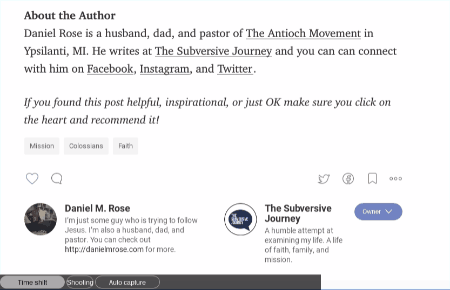

Do Justice. No Really. was originally published in The Subversive Journey on Medium, where people are continuing the conversation by highlighting and responding to this story.
Read the responses to this story on Medium.
from The Subversive Journey https://danielmrose.com/do-justice-no-really-b267820d4d44?source=rss—-bbc765b79ec5—4
via IFTTT
My Dirty and Not So Secret Secret
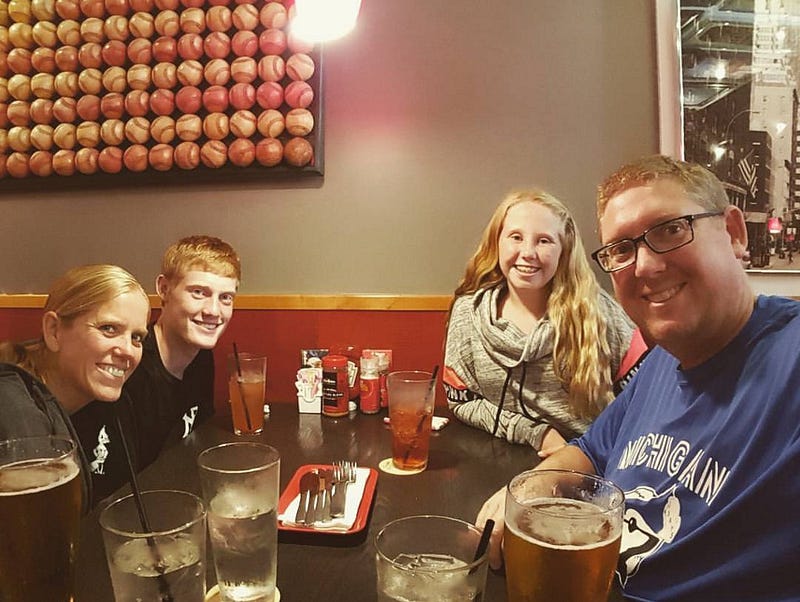
I have a dirty secret.
Honestly, it’s not that much of a secret.
I am white, American, and male. Those three facts alone mean that I experience on a daily basis a level of privilege that many people don’t.
OK, many of you are about to stop reading and your eyes have rolled into the back of you head. I actually heard them roll. I have a teen-agers, trust me I can see an eye roll a mile away. Please keep reading. This is going somewhere. It’s not another “white man self-loathing” kind of piece.
My parents were divorced when I was nine. My mom worked multiple jobs to make ends meet and provide for my brothers and I. Unlike many, my Dad was present in our lives. We saw him every other weekend and he always paid his child support. If we needed money for sports or a school trip he provided it when we asked. I am confident that if we were ever in major financial trouble he would have made sure that we were taken care of.
My mom was a teacher and had good health insurance. When we were sick we could go to the doctor. We went to the dentist regularly and got braces too. My parents provided for my two brothers and me to attend four years of college.
My grandparents provided a relational and financial safety net. When our home was unlivable due to a broken pipe we didn’t become homeless. We were able to live with my grandmother. We we are able to continue going to the same school because my mom and I both had cars.
Was life easy growing up in a broken home where money was always tight? No. Did I have everything I wanted? No. Did I ever go without something I needed? No.
Was I privileged? Yes.
I am a 40 year old man and I have never been stopped by a police officer unless I was breaking the law. Every time I have been guilty of the offense, every time. Every time I have been pulled I have been nervous, so nervous that my heart was in my throat and my hands shook. But, I can honestly say that I have never been afraid. I have never been followed around in a store. I have never had another person switch to the other side of the street when they have seen me coming. I have set off the security alarms at stores and nobody even cares to check my bag, they simply wave me on through. My son and I have never been kicked off a ball field (this did happen when we were there with four black players). I have never worried about getting a loan.
Am I privileged? Yes.
Am I ashamed of my privilege? No.
I am grateful. I grateful to be who God made me. I thankful that he saw fit to provide these tremendous blessings to me. I did nothing to earn my status in this culture. God, in his grace, made me who I am.
I am not ashamed, but I am humbled. Have I worked hard in life? Yes. My parents taught me a work ethic that never quits. I continue to work hard. But, I haven’t worked any harder than friends of mine who are people of color. Yet, certain opportunities have eluded them. Why? Most likely because they did not get to start life with the same kind of cultural position that I did.
If life is like a race, then I got to start a lap ahead of many of my friends. Is it fair? No. Did I do anything to deserve it? No. It’s grace. I am grateful. I am humbled by the reality of all that God has provided for me and my family. His generational grace to us is overwhelming.
Many people see “privilege” as some sort of shaming that is being done to those of us in the majority culture. On the contrary, I think if we can recognize that it is grace and blessing then we can take this privilege and begin to use it. We can use our place in society to try and bring justice to those who desperately need it.
Micah 6:8 says,
“He [God] has shown you, O mortal, what is good. And what does the Lord require of you? To act justly and to love mercy and to walk humbly with your God.”
Those of us who have been graciously given a position of privilege in this culture have an opportunity to use that privilege to “act justly”, “love mercy”, and “walk humbly with” God.
As I read through the Acts of the Apostles I am struck by how Paul leveraged his privilege. He was a Roman citizen, and a Jew. His privilege came from his citizenship. Throughout his story he leverages his privilege to bring justice, mercy, and spread the gospel.
It is my great hope that I will embrace the grace that God has extended to me and that I might follow Paul’s footsteps. It is my prayer that I would be one who acts justly, loves mercy, and walks humbly with God.
About the Author
Daniel Rose is a husband, dad, and pastor of The Antioch Movement in Ypsilanti, MI. He writes at The Subversive Journey and you can can connect with him on Facebook, Instagram, and Twitter.
If you found this post helpful, inspirational, or just OK make sure you click on the heart and recommend it!
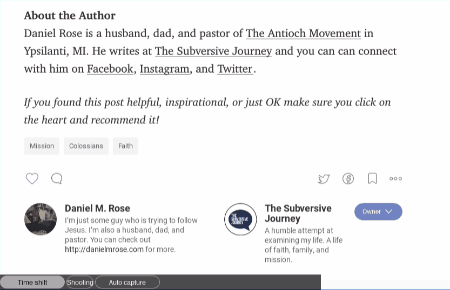

My Dirty and Not So Secret Secret was originally published in The Subversive Journey on Medium, where people are continuing the conversation by highlighting and responding to this story.
Read the responses to this story on Medium.
from The Subversive Journey https://danielmrose.com/my-dirty-and-not-so-secret-secret-be560a174c52?source=rss—-bbc765b79ec5—4
via IFTTT
Two of the most important things I’ve ever written.
Happy fall Subversive Journeyers! I trust that you are well and that you’re enjoying the beauty of the autumn. This is my favorite time of year. I love the temperature and the colors that begin to explode in the trees and in the sky.
Last week I wrote something that might be the most important thing that I’ve ever written. Today, I might have written the second most important. I don’t know, maybe they’re just noise. But, I would love for you to read them and share them if you think they’re worth anything.
It’s Not That Hard. It’s Exactly That Hard.
Grace and Peace,

Two of the most important things I’ve ever written. was originally published in The Subversive Journey on Medium, where people are continuing the conversation by highlighting and responding to this story.
Read the responses to this story on Medium.
from The Subversive Journey https://danielmrose.com/two-of-the-most-important-things-ive-ever-written-bc770606c056?source=rss—-bbc765b79ec5—4
via IFTTT
It’s Not That Hard. It’s Exactly That Hard.
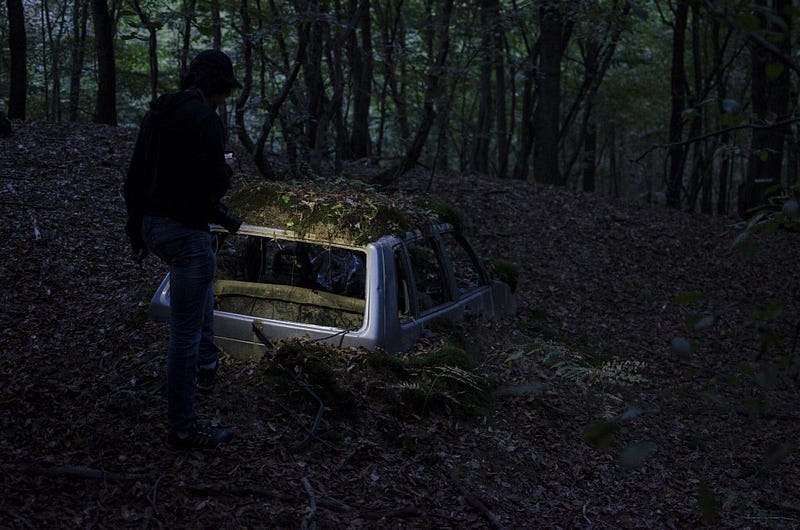
Today, I sat in on a meeting where the main topic of discussion was “racial reconciliation.” We were all pastors and all but one of us were white and male. The lone exception was a black woman. She is someone that I count as a friend and I think the feeling is mutual.
Our conversation was started because there was a community worship service that was poorly attended by white congregations. My congregation didn’t attend. I didn’t even share it with my congregation. It just didn’t fit into the calendar or the mission. Nevertheless, this was the reason we began discussing “racial reconciliation.”
People were sharing their great wealth of knowledge behind why there is a racial divide here. It was decided, with a great chorus of “Mmhmmms” that there is a “spirit” oppressing our area. It was also decided that we need a prayer program to try to fix the situation.
I don’t know if I said more than two words. As the conversation progressed I became sadder and sadder. I saw my friend’s countenance, she was becoming sadder and sadder too. Maybe I was projecting, I don’t know for sure. The people around the table are well intention-ed and they are good people. They are very serious about wanting to see things change in our city.
Over the years from talking with friends who are helping me understand more about what it means to be a black person in our area I am consistently being reminded of a couple of things. First, change comes through relationships being built it doesn’t come through programs. Second, if we want to follow a biblical model of reconciliation it means that the majority culture person needs to take the first step.
Prayer meetings are wonderful. Workshops and facilitated conversations can be very helpful. Sometimes, you need a program to break the ice.
However, if we want change then us pastors need to lead by building friendships across the racial and geographic barriers that exist in our city. We don’t need to create programming for our people. We need to model for them the relationships that we expect them to have. We must step out into the racial void show our congregations how to have friendships.
Breaking down racial divides is as easy as building new friendships. It’s entering into a relationship to learn and listen and love. Building new relationships, especially outside of one’s racial group, is really hard. It’s hard because we are afraid. We are afraid of rejection. We are afraid that we will be confronted with things that we don’t like about ourselves. We are afraid because it forces us out of our echo chamber. We are afraid because so many of us have created an image in our of “the other.”
We can mask the fear in a one off program. We can hide behind a podium. We can cover it up in fancy religious language and passionate prayers. But, if we walk through the door and haven’t begun a new relationship that endures in the gaps of our lives, we have done nothing.
It’s not that hard. It’s exactly that hard.
About the Author
Daniel Rose is a husband, dad, and pastor of The Antioch Movement in Ypsilanti, MI. He writes at The Subversive Journey and you can can connect with him on Facebook, Instagram, and Twitter.
If you found this post helpful, inspirational, or just OK make sure you click on the heart and recommend it!

It’s Not That Hard. It’s Exactly That Hard. was originally published in The Subversive Journey on Medium, where people are continuing the conversation by highlighting and responding to this story.
Read the responses to this story on Medium.
from The Subversive Journey https://danielmrose.com/its-not-that-hard-it-s-exactly-that-hard-376eefeebea?source=rss—-bbc765b79ec5—4
via IFTTT
Here is What I Know…

Two young black men were riding home from football practice in my car. The four us were laughing, cutting up, and making fun of each other. We came up on multiple police cars and officers investing something. These two young men immediately folded their hands in their lap, became quiet, stared straight ahead, and were silent.
After we passed the officers there was a moment and then the teasing, laughing, and cutting up began again.
My brother and many of my closest friends are police officers. I love police officers. I am grateful for them and the service they provide. We couldn’t live the lives we do without them.
But, in that moment it, there was fear, a raw fear that sucked the air out of my car. This fear demanded two young men to immediately become silent upon seeing officers even while being in the car of a white man.
We can love and respect and support our police officers and still recognize that there is something beyond broken in our culture. This fear was real.
I have no answers.
But we need to make changes. Those of us who are white need to learn. We need to listen. We must not marginalize people’s experiences.
As a pastor, I have to lead in the pursuit of justice. I’m still learning what that means. I know that it won’t be done on social media. It will be done in relationships, relationships that I pursue. I will be able to lead only as I change.
All I know, is that there are good young men, honorable young men, hard working young men, who live their lives in fear. They know a fear that my son will never know.
And that isn’t right.
That has to change.
About the Author
Daniel Rose is a husband, dad, and pastor of The Antioch Movement in Ypsilanti, MI. He writes at The Subversive Journey and you can can connect with him on Facebook, Instagram, and Twitter.
If you found this post helpful, inspirational, or just OK make sure you click on the heart and recommend it!
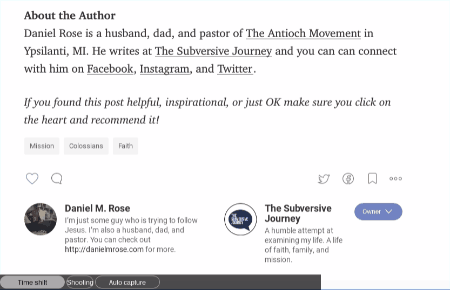

Here is What I Know… was originally published in The Subversive Journey on Medium, where people are continuing the conversation by highlighting and responding to this story.
Read the responses to this story on Medium.
from The Subversive Journey https://danielmrose.com/here-is-what-i-know-fc3b2d002b2c?source=rss—-bbc765b79ec5—4
via IFTTT
Will You Forgive As You’ve Been Forgiven?
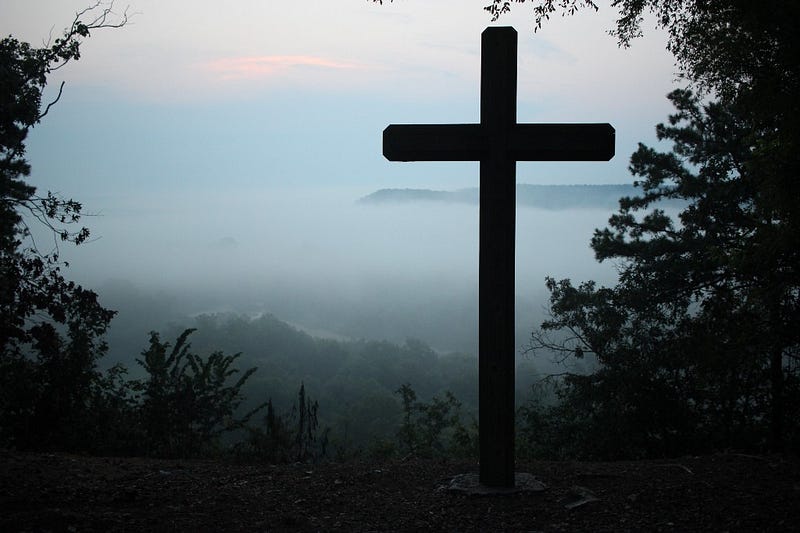
The way of Jesus is not easy. One of my favorite quotes is from G.K. Chesterton who said,
Christianity has not been tried and found wanting; it has been found difficult and not tried.
To follow Jesus, to be a Christian, is decidedly hard. To follow Jesus demands us to stop focusing on ourselves. If we claim to follow Jesus, then we must become a people who are living after him and living according to “the Way.”
A central tenet of the Jesus way is forgiveness. Jesus said,
For if you forgive others their trespasses, your heavenly Father will also forgive you, but if you do not forgive others their trespasses, neither will your Father forgive your trespasses.
In Colossians 3 Paul echoes what Jesus says,
Put on then, as God’s chosen ones, holy and beloved, compassionate hearts, kindness, humility, meekness, and patience, bearing with one another and, if one has a complaint against another, forgiving each other; as the Lord has forgiven you, so you also must forgive.
The Christian must forgive. It’s not an option. It’s not something we get to choose and decide that we don’t want to do that today. No, the call to forgive is an imperative, it’s a command.
Think about this for one moment. If you say you follow Jesus you are commanded to forgive.
Christian, how are you doing with this?
Now, before you set aside the command to forgive by saying, “Paul is only referring to other Christians,” let me stop you. Yes, Paul is being very explicit about the necessity to forgive other followers of Jesus. Clearly, we are failing at this. When our family history includes two schisms (East from West, and Catholic from Protestant) and countless local congregation splits, we have ample evidence of our need to recall Paul’s explicit command.
Beyond that, Jesus simply says, “others.” Paul is doing what many other writers in the Bible do. They take the global and broad scope laid out by God and make it more specific to help move the people of God down the road a bit. Or as Leo Marvin would say, “Baby steps.”
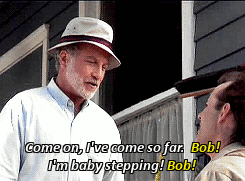
So, I ask again, how are you doing? Are you forgiving others as you’ve been forgiven? If not, I think it might be because we don’t fully realize the depth of our forgiveness. Check out this story that Jesus tells (from Luke 7),
“A certain moneylender had two debtors. One owed five hundred denarii, and the other fifty. When they could not pay, he cancelled the debt of both. Now which of them will love him more?” Simon answered, “The one, I suppose, for whom he cancelled the larger debt.” And he said to him, “You have judged rightly.” Then turning toward the woman he said to Simon, “Do you see this woman? I entered your house; you gave me no water for my feet, but she has wet my feet with her tears and wiped them with her hair. You gave me no kiss, but from the time I came in she has not ceased to kiss my feet. You did not anoint my head with oil, but she has anointed my feet with ointment. Therefore I tell you, her sins, which are many, are forgiven — for she loved much. But he who is forgiven little, loves little.” And he said to her, “Your sins are forgiven.” Then those who were at table with him began to say among themselves, “Who is this, who even forgives sins?” And he said to the woman, “Your faith has saved you; go in peace.”
One of the things that this story shows us is that if we understand the depth of our sin we will also understand the depth of the forgiveness that Jesus gives. This understanding drives us to love and forgive others in equal measure. Sadly, many of us do not forgive. We struggle to forgive our brothers and sisters, let alone those outside the faith.
How different would this world look if Christians engaged it with a posture of forgiveness?
What if we were more willing to forgive than to demand our rights?
What if we were a little more like Jesus? Remember what he prayed as he hung on the cross dying on behalf of his creation which had utterly rejected him (Luke 23:34),
“Father, forgive them, for they know not what they do.”
Behold our king! Even on the cross dying an unjust death offered forgiveness!
What about you? Will you forgive others?
About the Author
Daniel Rose is a husband, dad, and pastor of The Antioch Movement in Ypsilanti, MI. He writes at The Subversive Journey and you can can connect with him on Facebook, Instagram, and Twitter.
If you found this post helpful, inspirational, or just OK make sure you click on the heart and recommend it!
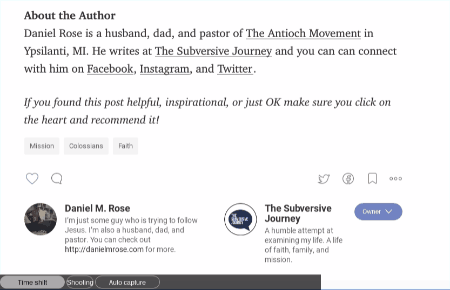

Will You Forgive As You’ve Been Forgiven? was originally published in The Subversive Journey on Medium, where people are continuing the conversation by highlighting and responding to this story.
Read the responses to this story on Medium.
from The Subversive Journey https://danielmrose.com/will-you-forgive-as-youve-been-forgiven-b68b7ae21111?source=rss—-bbc765b79ec5—4
via IFTTT
“Alright, alright, but what IS the gift?”

The sun was slowly setting over the horizon. The reds, oranges, and purples were magnificent. Our bellies were satisfied from the meal and the laughter was contagious. A cool breeze gently blew as we gathered on the deck with the Scriptures open.
We began reading…
Blessed be the God and Father of our Lord Jesus Christ, who has blessed us in Christ with every spiritual blessing in the heavenly places, even as he chose us in him before the foundation of the world, that we should be holy and blameless before him. In love he predestined us for adoption as sons through Jesus Christ, according to the purpose of his will, to the praise of his glorious grace, with which he has blessed us in the Beloved.
In him we have redemption through his blood, the forgiveness of our trespasses, according to the riches of his grace, which he lavished upon us, in all wisdom and insight making known to us the mystery of his will, according to his purpose, which he set forth in Christ as a plan for the fullness of time, to unite all things in him, things in heaven and things on earth.
As the words and ideas washed over us they filled our hearts and imaginations. We talked about the glorious grace that is lavished on God’s people. We marveled together at God’s great plan of redemption that has been in place from eternity.
In passing, I mentioned that this grace was a gift from God.
Logan, a 6th grader who is always listening, always questioning, and always perceiving asked, “Alright, alright, but what is the gift?”
That really is the question isn’t it?
It just might be the question.
The gift is, in a word, adoption.
When we place our faith in Jesus we are adopted into God’s family. We become part of this family that is chosen, loved, and forgiven. Think of it! We are wanted by God even though we have sinned against him.
By becoming a part of God’s family, by being adopted by our heavenly father, we receive “every spiritual blessing in the heavenly places.” What are these? They aren’t listed anywhere, but, we can know these blessings include: grace, mercy, love, forgiveness, joy, life, and peace. The Hebrew word for this would be “shalom.” Which is being made whole. The word Paul uses in Ephesians is “redemption.”
The greatest gift that we have been given is to have been adopted into God’s family. Why? Because it means that we can live as ones who are chosen, loved, and forgiven.
About the Author
Daniel Rose is a husband, dad, and pastor of The Antioch Movement in Ypsilanti, MI. He writes at The Subversive Journey and you can can connect with him on Facebook, Instagram, and Twitter.
If you found this post helpful, inspirational, or just OK make sure you click on the heart and recommend it!
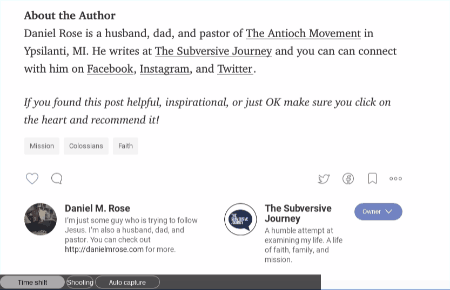

“Alright, alright, but what IS the gift?” was originally published in The Subversive Journey on Medium, where people are continuing the conversation by highlighting and responding to this story.
Read the responses to this story on Medium.
from The Subversive Journey https://danielmrose.com/alright-alright-but-what-is-the-gift-3f457c6b1144?source=rss—-bbc765b79ec5—4
via IFTTT
The 100!

Good morning! I hope that you’re well and that you are experiencing grace and peace. Today I opened Medium to find that The Subversive Journey had cracked 100 followers. Thank you to those of you have been here from the start. I hope that you will continue on with me and that you will continue to share the things here that you find helpful.
In light of reaching this little milestone here a couple of posts from the past that are still some of my favorites. Maybe you will like them too:
Baseball and Grace (February, 2015)
Baseball, Redemption, and a Hospital Room (May, 2009)
Thank you again for joining me on my journey!

The 100! was originally published in The Subversive Journey on Medium, where people are continuing the conversation by highlighting and responding to this story.
Read the responses to this story on Medium.
from The Subversive Journey https://danielmrose.com/the-100-eebcabb02b2f?source=rss—-bbc765b79ec5—4
via IFTTT
Is the Church called to be “Counter-Cultural”?
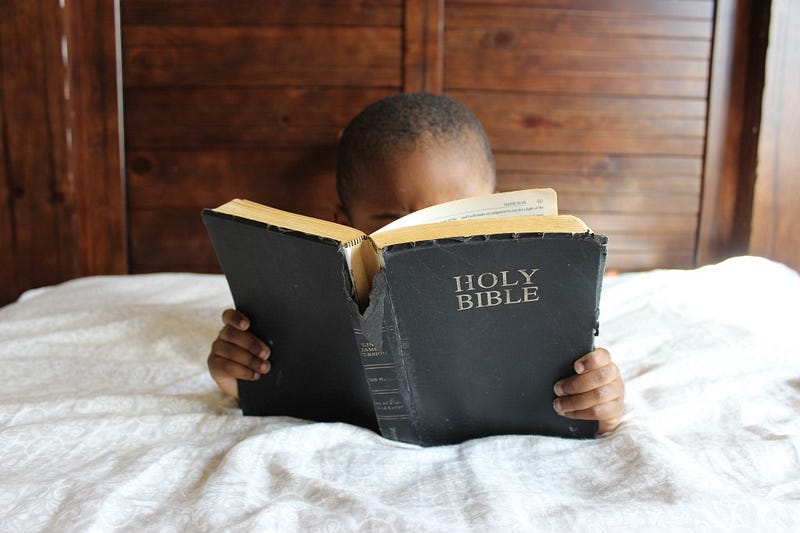
I read many articles and books about what it means to be “the Church.” As a pastor of a new congregation I think that I need to continue to refine and deepen my understanding of what the Church ought to be. A concept that consistently pops up, particularly in blogs, is that the Church is “called” to be counter-cultural. This idea is foundational to what many refer to as the “culture war” that has been raging for decades in the United States. To be faithful to the Church necessarily demands that you are in a posture that is “counter” to the culture, at least that’s how the thinking goes.
I am growing unconvinced that there is such a call.
What I am more convinced of then ever is that the Church is called to create culture.
As I continue to study and read the Scriptures and work really hard to apply their truths to my life I am learning that the follower of Jesus is called into life. We are called into mission. We are called into community. We are called into culture creation.
There is a calling out of darkness and into the kingdom of the beloved son.
There are enemies: our flesh, the world (broken human systems, injustice, etc, not other people), and the devil. We strive against these by setting our minds on what is good, holy, and righteous. We do not strive against them through destruction but ultimately through creation.
Is the Christian called to be different? Yes. But is the Christian called to be “counter”? I don’t think so, at least not in the active sense.
What do I mean?
Generally speaking the idea of being “counter-cultural” refers to taking action against the culture. This action usually is described as rejecting the unrighteous world around us. Typically, you see this by the “do-not” list that is either overtly or implicitly taught.
We see the “counter culture” war waged through the efforts of well meaning Christians who boycott certain companies. These attempts at being “counter-cultural” spill over into the way Christians engage their relationships. “Oh you do or believe in such a such? Well, you know you’re going to hell. And I can’t be around you.”
Some friends of ours were at the Michigan football game this past Saturday. Outside of the stadium there was a man and woman with a megaphone berating passersby with the message that they were going to hell and there was no message of grace. These people were clearly counter-cultural and they were also counter-gospel.
The Christian is not called to be “counter cultural” by taking action against the culture within which they live.
Christians are called to pursue a life that is marked by holiness. This means they are taking action to become something different. The identity of a Christian is not marked by what they are against but what they are for. The Christian is ultimately to pursue holiness.
As we pursue holiness we will necessarily have lives that look different from those around us. The holy life is marked by the consistent development of love, joy, peace, patience, kindness, goodness, gentleness, and self-control. Paul writes, “Finally, brothers, whatever is true, whatever is honorable, whatever is just, whatever is pure, whatever is lovely, whatever is commendable, if there is any excellence, if there is anything worthy of praise, think about these things. (Philippians 4:8)”
Paul emphasizes a change in thinking because it is by the renewing of our minds that actions change. When we begin to set our minds on the things above then we will begin to offer ourselves as living sacrifices (Romans 12:1).
The Christian is called to be holy (which means set apart). As we pursue this calling we will look different than our culture in some ways. Yet, we will also reflect it in other ways. We will reflect our culture in the ways that it is true, honorable, just, pure, lovely, commendable, and excellent. We will look different from it in the ways that it is untrue, dishonorable, unjust, impure, and unlovely.
As Jesus’ ambassadors to the world we are not called to be against his creation. We are called to engage it. As we engage with culture our hope is that we will create something true, honorable, just, pure, lovely, commendable, and excellent. We then trust that God will redeem those aspects of the culture that are untrue, dishonorable, unjust, impure, and unlovely.
No, we are not called to be counter-cultural. We are called to create culture and to be agents of redemption within it.
About the Author
Daniel Rose is a husband, dad, and pastor of The Antioch Movement in Ypsilanti, MI. He writes at The Subversive Journey and you can can connect with him on Facebook, Instagram, and Twitter.
If you found this post helpful, inspirational, or just OK make sure you click on the heart and recommend it!
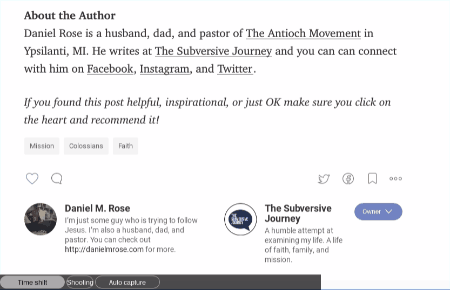

Is the Church called to be “Counter-Cultural”? was originally published in The Subversive Journey on Medium, where people are continuing the conversation by highlighting and responding to this story.
Read the responses to this story on Medium.
from The Subversive Journey https://danielmrose.com/is-the-church-called-to-be-counter-cultural-180fcb1bdd92?source=rss—-bbc765b79ec5—4
via IFTTT
Put on Love!

For most of my professional life I have often been told that I’m not approachable. You see, when it comes to things like Meyers-Briggs (ENTJ) or Strength Finders, my profile comes out as, “Jerk.”

When I served with a campus ministry I would often have to spend a great deal of time apologizing to the women with whom I worked alongside. It usually wasn’t anything that I particularly did. Yet, there was something there that created tension and caused some sort of break in our relationship.
After leaving the campus ministry I continued to work through this area of my life. What God began to reveal to me was that I was not “putting on love.”
I am very much truth oriented. My preference is for people to play it straight and give me the facts. I don’t like it when people beat around the bush. I don’t sugar coat anything. In many conversations I would simply drop the truth bomb, “it’s biblical, that’s why.” Which is the pastor’s version of the great parental saying, “Because I said so!”
I was not very loving. I missed out on half of the command from Paul in Ephesians 4:
Rather, speaking the truth in love, we are to grow up in every way into him who is the head, into Christ, from whom the whole body, joined and held together by every joint with which it is equipped, when each part is working properly, makes the body grow so that it builds itself up in love.
No, I simply heard, “…speaking the truth…” and missed the love piece. In Colossians 3, Paul writes,
Put on then, as God’s chosen ones, holy and beloved, compassionate hearts, kindness, humility, meekness, and patience, bearing with one another and, if one has a complaint against another, forgiving each other; as the Lord has forgiven you, so you also must forgive. And above all these put on love, which binds everything together in perfect harmony.
He reminds us that we must “put on love” above all else. We can do this only as we understand who we are in Christ. We can love well when we know that we are chosen, holy, and beloved. When we are confident in the love that the Father has for us through Christ then we can love well.
As we love well we will discover that it “binds everything together in perfect harmony.” What is this everything? It all that comes before! Compassion, kindness, humility, meekness, and patience. All these work together in perfect harmony when we first put on love.
Will you put on love today?
About the Author
Daniel Rose is a husband, dad, and pastor of The Antioch Movement in Ypsilanti, MI. He writes at The Subversive Journey and you can can connect with him on Facebook, Instagram, and Twitter.
If you found this post helpful, inspirational, or just OK make sure you click on the heart and recommend it!

Put on Love! was originally published in The Subversive Journey on Medium, where people are continuing the conversation by highlighting and responding to this story.
Read the responses to this story on Medium.
from The Subversive Journey https://danielmrose.com/put-on-love-3f5935ccfb51?source=rss—-bbc765b79ec5—4
via IFTTT
I’m Taking My Bible and Going…
We live in a time when there are congregations designed to meet every desire. Do you like contemporary music? Do you like traditional music? Do you like a young pastor? Do you like an old pastor? Do you like modern architecture or traditional? Do you prefer Sunday centric or mission centric? Do you…do you…do you…?
“Church hopping” and “Church shopping” are phrases that are now significant parts of the American Christian experience. Long gone are the days of aligning with a particular doctrinal standard and being a part of that particular congregation. Long gone are the days of being committed to church discipline and the like because, well, you just go down the street.
While much of this is owed to the individualism inherent in the Americanization of the church in the United States there is something deeper that I think we have largely lost.
Paul, in Colossians 3, challenges followers of Jesus to “put on” certain qualities as a result of their identity in Christ. One of these is “…patience, bearing with one another and, if one has a complaint against another, forgiving each other; as the Lord has forgiven you, so you also must forgive.”
I think that we have largely lost this in our congregations. We, the people who ought to understand the most about forgiveness, lack the willingness to patiently bear with one another and forgive. Why would we? There’s another congregation down the street that will “meet my needs” more. Their music is better, their pastor is cooler, and the people are nicer.
I love how Paul assumes the existence of conflict within the community of faith. We are all broken and imperfect. None of us will do the right thing all the time. We will sin against other people and other people will sin against us. It’s part and parcel to being a human in relationship with other humans. Instead of patiently bearing with one another we too often pick up our Bible and go.
To be patient demands from us a strength and courage to step into conflict. We must turn and look at it straight in the face. Then, as we do, we extend forgiveness.
Are there times when fellowship needs to be broken? I think so. Particularly in situations of abuse. At the same time, we must also wrestle with the necessity that sometimes church discipline is necessary and is not abuse. In the same way that disciplining a child is not always abuse. In the same way that there is a clear line between sending a child to their room and neglect, there is a line between proper church discipline and spiritual abuse.
I long for the day when “church hopping” and “church shopping” are things of the past.
In that same passage in Colossians 3 Paul tells us that we are chosen, holy, and beloved. If we can begin to see other followers in that light it makes it just that much easier to patiently bear with one other extending forgiveness. Why? Because God is. God is patiently bearing with us and forgiving us.
Let us do the same.
from The Subversive Journey https://danielmrose.com/2016/08/26/im-taking-my-bible-and-going/
via IFTTT
Meek? What the?
Jesus is famous for saying, “The meek shall inherit the earth.” In Colossians 3, Paul says that the follower of Jesus must put on “meekness.” What is it?
Many think that meekness is the opposite of being a “matador” as Frank Underwood says,
But is that really what meekness means? If Jesus commanded us to be meek, I have hard time thinking that it has much to do with being a doormat. If anyone was not a doormat, it was Jesus. He’s about as strong and tough as it comes. So, while meekness has gotten a bad wrap in our culture, I think it means something else.
Merriam-Webster’s Dictionary gives this as the primary definition of meekness: “enduring injury with patience and without resentment.” This sounds like Jesus. This sounds like Paul.
Could you imagine being a follower of Jesus and living this way? Choosing to endure injury with patience and without resentment. This takes strength and courage. This demands an extension of grace, mercy, and forgiveness.
We live in a time when every perceived slight sends people off the deep end. It seems as though many are offended all the time. There seems to be little that doesn’t offend. What we need is more meekness. We desperately need more people who are willing to endure injury with patience and without resentment.
Without resentment. That catches me up short. Often people will acquiesce to something but then they will resent the person that they have yielded to.
Where can we find such strength and courage? I think it comes from our identity. Who we are as followers of Jesus. If we could own and embrace the reality that we are chosen, holy, and beloved (Colossians 3) then we would have a basis from which to be meek. We must have a base from which to be meek from. This base is our identity in Christ.
from The Subversive Journey https://danielmrose.com/2016/08/25/meek-what-the/
via IFTTT
You Boost So Hard
Over the last few months I have learned that the second greatest sin in my son’s teenage world is to “boost” (here’s the first great sin). There may not be anything worse than to be known as someone who “boosts”. If you’re like me you’re thinking, “I have no idea what those words mean.” To “boost” is to exaggerate your exploits. There are certain guys who boost about their lift or their forty time or the girls they talk to. The thing is, everyone knows the truth so they get called out and branded as a “booster”.
It turns out that the Bible talks about boosting. No really. In the Scripture it’s called “humility.” Humility is best understood as a right understanding of yourself. To be humble is to know who you really are before God.
Some people have in their mind that humility is the person who walks around saying things like, “I’m such a sinner,” or “I’m the worst of the worst, man I’m terrible,” or “I’m not worth anything.” Here’s the crazy thing, for the Christian, saying those kinds of things are actually pride. Pride is the opposite of humility. Pride is an incorrect view of oneself before God. Many people think that pride is just thinking too highly of oneself. But that’s not really it. It includes thinking too lowly of oneself too.
In Colossians 3 Paul says,
Put on then, as God’s chosen ones, holy and beloved, compassionate hearts, kindness, humility, meekness, and patience, bearing with one another and, if one has a complaint against another, forgiving each other; as the Lord has forgiven you, so you also must forgive.
As we seek to follow Jesus we have to keep putting on humility. Every day we wake up and every day we put it on. Who are we before God? We are chosen, holy, and beloved. This is who we are. Do the followers of Jesus sin? Yes. That’s why we confess and repent. Are the followers of Jesus perfect? No. That’s why we confess and repent. Are we great? Not really, but our God is and he loves us.
Humility, true humility is living into this one reality: You are chosen, you are holy, and you are loved.
from The Subversive Journey https://danielmrose.com/2016/08/24/you-boost-so-hard/
via IFTTT
You’re Not Like That
Nearly every time I have conversation with someone who is not a Christian about the Christian faith they say something like, “You’re not like other Christians.” I take that as a complement. Although, recently it has begun to raise some questions in me.
It seems like a lot of my friends who aren’t Christians don’t want to become a follower of Jesus because of their perceptions of “Those Christians.” Many of them don’t know any of “Those Christians.” They know me though and tell me that I’m different from “Those Christians.” So if that’s the case why let this caricature of “Those Christians” impact so much of your worldview?
I know this to be true: Most Christians are like me. Most of us are aware of our brokenness and most of us are wounded healers. That is, we come alongside not as those who have finished the race but as those who are fellow sojourners.
We see on TV and the Internet the worst of ourselves. Whether it’s Christians, Muslims, Police Officers, or Activists, it’s the worst half percent that get all the attention. What we very rarely hear of are those who quietly and faithfully live lives of character, integrity, and humility loving well and impacting their neighbors for good.
I am grateful that my friends see me as something different from the norm. What I’d like even more is that they would stop comparing me to a ghost, a shadow Christian. I’m here, I’m real, I’m in the flesh.
If you hate Jesus because of “his followers” then I’d challenge you to look around and ask yourself, “Are the followers I know like the caricature that social media memes created?” If not, then be honest enough to change your view.
If you say you’re a Christian then I’d challenge you to look in the mirror and ask yourself, “Am I a jerk? Do I have a martyr complex because people don’t agree with me? Do I pick fights?” If you do, then be honest, confess your sin, repent, and change.
from The Subversive Journey https://danielmrose.com/2016/08/13/youre-not-like-that/
via IFTTT
Expectancy
I have been reading the poetry of Amy Carmichael recently. There’s something about poetry that really grabs you in a different way than prose. It opens your emotions and your heart. For me it breaks me out of my intellectualism and gets my head out of the clouds and brings me back to earth.
As I read this morning there was a poem called, “Expectancy”, that captured something that has been rolling around in my heart and head. It gave words to this ever growing sense in me of the ever present “already but not yet” reality of being a Christian. As I wade through the section of Scripture about the exile of God’s people I am seeing so many connections to our own time.
Peter says that we are sojourners and exiles. Why? Because we are part of Jesus’ kingdom and his kingdom is not of this world. We wait for it, with expectancy. So, we live with the knowledge that the kingdom isn’t here yet. This tension is strong in my experience right now that I could cut it with a knife.
Carmichael, for me in this moment, has the words:
The mountains hold their breath;
The dark plain wispereth,
“Hush, O thou singing rivulet,
The sun hath not come yet.”
The dawn-wind bloweth cold,
On fen and fell and world,
And heavy dews the lowlands wet –
But he hath not come yet.
And now the silver star
That far can see, doth far
And farther call, “The time is set,
And he will not forget.”
— — — —
Lord of the morning star,
Lord of the singing brook,
Lord of the peaks that to a far
And clear horizon look –
Lord of the delicate
Faith flush in lighted air,
I with all this would watch and wait,
Rejoicing and aware.
(As published in “Mountain Breezes: The Collected Poems of Amy Carmichael”)
The last two lines catch me up short: “I with all this would watch and wait, rejoicing and aware.“
May we ever be rejoicing and aware of the reality that “The time is set, and we will not forget.” It is the already, not yet.
from The Subversive Journey https://danielmrose.com/2016/08/11/expectancy/
via IFTTT
Exiles, Presidents, and Voters
Much like everyone else in the United States, I have been wrestling with what to do in November. There are many voices and competing claims. It often seems that there is little hope of making a good and wise decision. When it comes down to casting a vote it seems as though whichever way one goes will be to bow down Nebuchadnezzar and his golden image (Daniel 3).
What do we do? What do I do?
I think that before an answer of “who to vote for” can be given we must first answer “who am I?”
Our identity determines how we respond in these kinds of moments. So who am I? Ultimately, I am who the Bible tells me I am because I am a follower of Jesus.
Peter offers us some help in the second chapter of his first letter,
But you are a chosen race, a royal priesthood, a holy nation, a people for his own possession, that you may proclaim the excellencies of him who called you out of darkness into his marvelous light. Once you were not a people, but now you are God’s people; once you had not received mercy, but now you have received mercy.
Beloved, I urge you as sojourners and exiles to abstain from the passions of the flesh, which wage war against your soul. Keep your conduct among the Gentiles honorable, so that when they speak against you as evildoers, they may see your good deeds and glorify God on the day of visitation.
— 1 Peter 2:9–12
Who are we?
- a chosen race
- a royal priesthood
- a holy nation
- a people for his (God’s) own possession
- God’s people
- recipients of mercy
- sojourners
- exiles
This is who followers of Jesus are.
There are a couple of things that I don’t want you to miss. First, the follower of Jesus is part of a holy nation. This holy nation is not bound by geographic borders. It is not bound by ethnicity. It is bound by faith, it is marked out as those who receive mercy. This holy nation is not our nation or anyone else’s, it can simply be known as the “Kingdom of God.” This is where the Christian’s ultimate loyalty lies, with the people of God in the Kingdom of God. We can not be caught up in nationalism or globalism.
Second, we are sojourners and exiles. We are not yet in our home country. We are much like the Pevensies in Narnia. Though Narnia felt like home and they became comfortable there, their real home was elsewhere. When the people of God were sent into captivity, exiled, they were told by God to make homes for themselves, engage in business, and live, yet retain their identity as his unique people. There is no difference now as there was then. This place we live in is not our home. It’s not where we really belong. We belong in the kingdom with our King.
How does this help? First, it centers us and orients us to where are loyalties ultimately lie. They are with Jesus and none else. He is our true North. The follower of Jesus must fix her eyes on the King and start there. Second, it frees us from the constraints of the expectations of others. We are free to follow Jesus. As we follow him we learn to embrace his reality.
When it comes to the arena of politics we can know with certainty this one thing:
Let every person be subject to the governing authorities. For there is no authority except from God, and those that exist have been instituted by God.
– Romans 13:1
Whomever wins the election in our country or any other have been allowed to do so by God. This should give us great relief. There is nothing that surprises God. The one who wins is his man or woman for this time. Therefore, we are commanded to pray…
First of all, then, I urge that supplications, prayers, intercessions, and thanksgivings be made for all people, for kings and all who are in high positions, that we may lead a peaceful and quiet life, godly and dignified in every way. This is good, and it is pleasing in the sight of God our Savior, who desires all people to be saved and to come to the knowledge of the truth.
– 1 Timothy 2:1–4
Let us embrace our identity as sojourners and exiles by giving our loyalty to our one and only king, Jesus. Then, let us pray for those earthly leaders whom he appoints over us.
How should you vote? For whom should you vote? That I can’t tell you. What I can tell you is this: Pray. Study. Learn. Listen. Then, vote as one who knows that they are voting as ambassador for Jesus.
from The Subversive Journey https://danielmrose.com/2016/08/04/exiles-presidents-and-voters/
via IFTTT
Dance Like Yo Daddy!
How do you simultaneously love your daughter well, embarrass her and yourself? EASY! Dance in the Dad’s Dance at her studio in front of 100s. It was a ton of fun and I would do it again in a heartbeat. So, without further ado, here it is…
DANCE LIKE YO DADDY!
https://danielmrose.com/wp-content/uploads/2016/08/Dad-Dance.m4v
from The Subversive Journey https://danielmrose.com/2016/08/01/dance-like-yo-daddy/
via IFTTT
When Mom Moves Out
Nearly eighteen months ago our family did something crazy.
CRAZY I TELL YOU!
It was crazy if you asked anyone but the four of us living in this home. We invited my Mom, our kids Mimi, to come and stay with us. She is a retired teacher who has given her life serving others, not the least of which are her three sons, three daughter-in-laws, and five grandchildren. Nearly two years ago it became apparent that her apartment would no longer be sustainable. The rent in her area was skyrocketing. A teacher’s pension just could not keep up. So, she swallowed her pride, we moved into the guest room, and she set up home in our master bedroom: Mimi’s Suite.
As this unfolded we had many people who worried. They were afraid that this would ruin our relationship.
We weren’t. Not even a little bit.
Growing up, my mom taught us that when people you love were in need you helped them. You helped them in any way that you could. Her mom, my Mimi, taught her that. When I was in high school we had to move out of our house due to a major water leak. Where did we move? We moved our four person family into my Mimi’s two bedroom apartment.
Surely we could move one person into a four bedroom home.
She has now moved out. Mom bought a beautiful little condo and is happy as can be.
Our family? We have a Mimi shaped hole in our lives now. While most feared that this would ruin relationships, this time did the opposite. It deepened them in ways that we would have never expected. There was much laughter. There were amazing evening conversations. My mom got to see and experience first hand The Antioch Movement, our church plant in Ypsilanti. Libby and Mimi would sew, cook, and cuddle. She passed on much to her granddaughter that she will never forget. Ethan and Mimi laughed and played and Ethan ATE well. He got those special moments with her that most grandsons never get and wish they could have had. Amy and Mimi developed an ever deeper mutual respect as two strong women who know their hearts and minds. They taught one another and challenged each other to be a little better.
Me and mom? We discovered that we were both adults. We learned how to speak truth in love to one another. I watched as she helped run kids and never complained. She embraced her role as Mimi in a totally new way. There were days when we ran her ragged, yet she kept smiling and laughing. I realized that there is great power in a generous smile and a gentle ear. These are two qualities that she has in spades. I knew that, but seeing it up close and personal was remarkable.
Our Mimi shaped hole will be filled with brief moments in the days to come. But they will be just that, moments.
from The Subversive Journey https://danielmrose.com/2016/07/21/when-mom-moves-out/
via IFTTT
To Be Kind
Have you ever had a friend come up to you and quietly say, “Hey man, you have a booger hanging out…”? When they do that you know you have a true friend. Why? Because they are kind.
Kindness is something we want in our friends. We don’t want niceness. A nice person would try to ignore the booger, the kind friend would tell you the truth.
That’s the key difference between being kind and nice. A nice person will think, “oh man they have a booger, I don’t want them to feel bad so I will ignore it.” The kind person acts from compassion and makes sure you don’t walk around all day with that booger hanging on.
In Colossians 3 the Apostle Paul is trying to help us understand our new identity, who we are in Christ. He first tells us that we are chosen, holy, and beloved. Then he calls us to have compassion hearts. The next attribute he cites is kindness.
Kindness is the loving application of truth to a person or situation. It requires a person to speak truthfully into the life of another, but it is done from a place of compassion. When truth is applied through compassion (or you could easily say, love) it brings healing and offers the other person grace and mercy.
When we act kindly we are acting out in love. To be kind is to act. To be kind is to engage. To be kind is speak the truth in love.
What would happen if you began to live this way? What would happen if we began to live this way? If we could begin loving well through acting kindly we might just change the world.
For the follower of Jesus to be kind is not something we do once in a while. Kindness it to be a mark of our very being. There will be times when kindness is not what people want. They will reject you because of it.
Doctors face this all the time. If their patient is obese or smokes or is an alcoholic they have to give them truth. The doctor has to tell them what they don’t want to hear: eat less, stop smoking, stop drinking. The patients often times get angry or frustrated. Yet, the doctor has to speak this truth into their lives so that they can live and be healthy.
So it is in all of our relationships. We are to put on kindness as followers of Jesus and live the truth of this out every single day.
The next time you see someone with a booger in their nose, be kind.
from The Subversive Journey https://danielmrose.com/2016/06/21/to-be-kind/
via IFTTT
Are You Cut Enough?
One of the great joys that I have in my job is flexibility. This means that I get to drive my kids around to their stuff. I also get to take their friends with us. As a result, I am in on a lot of the conversations that they are having. They are hilarious! When I was a kid we used to “dare”, “double dare”, “double dog dare”, “triple dare”, and finally “triple dog dare.” Today’s boys simply look deep into one another’s souls and say, “Bruh, you aren’t even cut enough to…”
When someone tells you aren’t “cut enough” that’s dropping a serious “triple dog dare” on them. You either put your tail between your legs and admit defeat or you go for it.
In Colossians 3:12–17 Paul lays out who we as Christians are to be. Who we are is based in the reality that we are chosen, holy, and beloved. How amazing is that? I mean think about that for half of a second. Our identity is not shaped by rules, laws, or fear of punishment. Our identity is based in God’s love for us. That in and of itself is mind boggling.
The first attribute he calls us to is to put on “compassionate hearts.” What does that mean? That sounds pretty soft, especially for men. We often think of compassion as something that women have. Not many men would naturally look at themselves and say that they are seeking to be compassionate. So what exactly is a compassionate heart?
The Merriam-Webster dictionary defines compassion this way, “sympathetic consciousness of others’ distress together with a desire to alleviate it.”
From the outset we are to be others centered. The Christian, in the core of who they are, is to be one who is conscious of another’s pain and desires to act. Compassion requires great strength. It is not something that is for the weak or soft. Compassion demands from us action to step into the brokenness of the world to bind up the wounded.
This little phrase that Paul uses, “compassionate hearts” is very purposeful by including the word “heart.” The heart is the center of our being. Who we are is changed by our relationship with Jesus. A compassionate heart, a state of being, that drives us to care for and alleviate suffering is our new normal. It isn’t “radical”, it is normal.
When you see suffering what is your response? Do you want to alleviate it? Do you care? Do you want to step into the brokenness of this world and set things right? These are all signs of a person with a compassionate heart.
If you call yourself a follower of Jesus, have you put on the compassionate heart?
Are you cut enough to be compassionate?
from The Subversive Journey https://danielmrose.com/2016/06/20/are-you-cut-enough/
via IFTTT